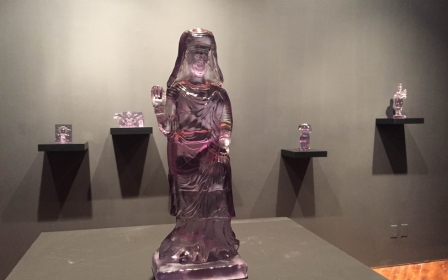Iraqi-born 'star' architect Zaha Hadid dies aged 65

Zaha Hadid, the Iraqi-British architect whose works included the aquatics centre used in the 2012 London Olympics, died on Thursday from a heart attack aged 65, her company said.
"It is with great sadness that Zaha Hadid Architects have confirmed that Dame Zaha Hadid died suddenly in Miami in the early hours of this morning," the statement said.
"Zaha Hadid was widely regarded to be the greatest female architect in the world today.”
Hadid had contracted bronchitis earlier in the week and suffered a sudden heart attack while receiving treatment, it added.
Hadid's other notable projects include the Italian National Museum of 21st Century Arts in Rome, the Heydar Aliyev Centre in Baku, the Rosenthal Center for Contemporary Art in Cincinnati and the Guangzhou Opera House in China.
Born in Baghdad in 1950, she studied mathematics at the American University of Beirut before coming to London to study in 1972.
She became the first woman to be awarded the prestigious Pritzker Architecture Prize and twice won Britain's most prestigious architecture award, the RIBA Stirling Prize, in 2010 and 2011.
Queen Elizabeth II honoured her with a damehood in 2012, and only last month she became the first woman in her own right to be awarded RIBA's Royal Gold Medal.
"Surely her work is special," renowned architect Peter Cook said on presenting the award. "For three decades now, she has ventured where few would dare.
"How lucky we are to have her in London," he added. "Our heroine."
Hadid was famous for designing curved and futuristic structures that often challenged the engineering and construction firms tasked with building them.
But she also faced criticism for designing one of the stadiums being built in Qatar for the 2022 football World Cup, walking out of a BBC interview last year after being asked about allegations of worker abuse on construction projects in the Gulf state.
The BBC subsequently apologised to Hadid for suggesting that deaths had occurred on World Cup-related construction projects.
Her design for the 2020 Tokyo Olympic stadium was also dropped by Japanese organisers because of cost issues.
But Jane Duncan, the president of the Royal Institute of British Architects, said Hadid had been an "inspirational woman".
"Visionary and highly experimental, her legacy despite her young age, is formidable," said Duncan.
"She leaves behind a body of work from buildings to furniture, footwear and cars, that delight and astound people all around the world.... The world of architecture has lost a star today."
New MEE newsletter: Jerusalem Dispatch
Sign up to get the latest insights and analysis on Israel-Palestine, alongside Turkey Unpacked and other MEE newsletters
Middle East Eye delivers independent and unrivalled coverage and analysis of the Middle East, North Africa and beyond. To learn more about republishing this content and the associated fees, please fill out this form. More about MEE can be found here.





